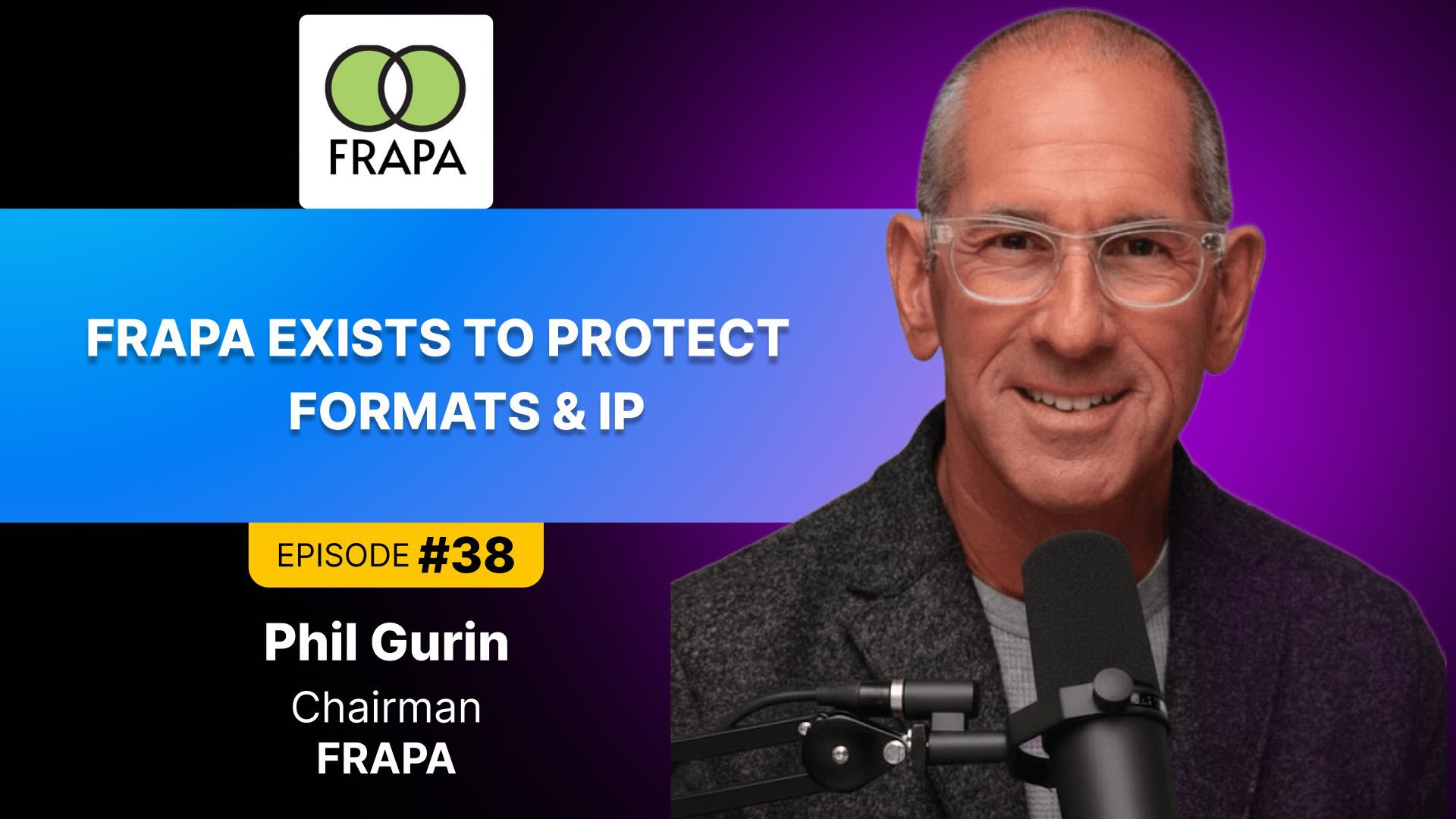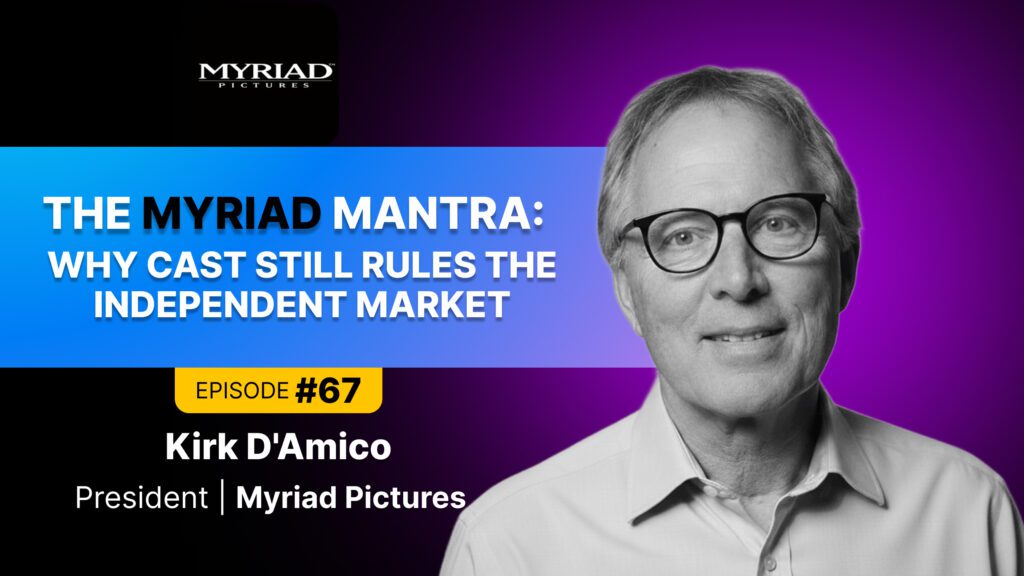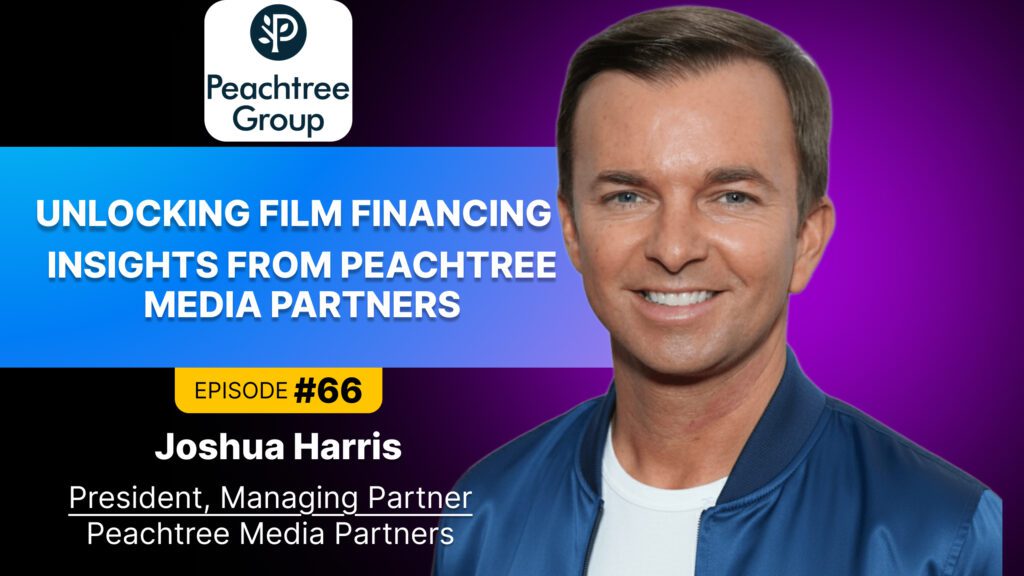“FRAPA exists to protect formats, promote cooperation, and help creators safeguard their intellectual property across the globe.”
Podcast Chapters
| Timecode | Chapter Title |
| 00:00 | Introduction to Phil Gurin and His Journey |
| 08:18 | Understanding TV Formats |
| 15:17 | The Role and Purpose of FRAPA |
| 24:05 | Developing and Licensing Formats |
| 30:05 | Negotiating Format Rights and Fees |
| 38:07 | Trends in Format Licensing and Adaptation |
Markets like the U.S., U.K., Netherlands, Israel, Korea, and Japan have become global format powerhouses because they can not only create compelling content, but also guarantee broadcast. Launching a format successfully starts with putting it on air — first to market often defines global success.
Key Takeaways:
✅ Formats are valuable intellectual property that must be protected.
✅ First to market often defines global success.
✅ FRAPA helps creators register, protect, and defend formats.
✅ The U.S., U.K., Netherlands, Israel, Korea, and Japan lead global format innovation.
✅ Creators must adapt to industry changes and embrace new opportunities.
Sound Bites:
🎙️ “First to market wins — every time.”
🎙️ “Formats are the backbone of the global entertainment business.”
🎙️ “Protect your format, protect your future.”
🎙️ “Without respect for IP, there’s no sustainable creative economy.”
🎙️ “Don’t panic. Be creative. Adapt and lead the next wave.”
About Format Recognition And Protection Association (FRAPA)
Why Partner With FRAPA?
✅ Protect Your Intellectual Property:
FRAPA helps creators safeguard their formats through registration, formal recognition, and advocacy — securing your rights globally.
✅ Strengthen Global Credibility:
Being a FRAPA member signals to the industry that you are a trusted, ethical player committed to fair trade in content and ideas.
✅ Access Dispute Resolution Tools:
FRAPA offers mediation and expert format analysis services, helping resolve conflicts quickly and cost-effectively without lengthy legal battles.
✅ Join a Global Creative Network:
FRAPA connects you with a worldwide community of format creators, producers, distributors, and buyers — opening doors for partnerships and collaboration.
✅ Stay Ahead with Industry Insights:
Through resources, events, and thought leadership, FRAPA keeps you informed about evolving trends, legal protections, and opportunities in the global formats market.
In Conversation with Phil Gurin, Chairman at Format Recognition And Protection Association (FRAPA)
This is a written version of the above podcast, summarized for quick reading. It is in a transcript format, now republished as a Q&A for easier consumption.
- Vitrina: Can you introduce yourself and share your journey into the world of formats?
Phil Gurin: I’m a writer, producer, creator, and I’ve always been a writer and a producer. Originally from New York, living in Los Angeles now for a very long time. I started as a freelance writer, director, producer for hire, working for about 70 companies before selling my own shows to US broadcasters. Our company is full-service — we create, find, co-create, sell, and make shows. About two years ago, we also set up TGC Global Entertainment to distribute and acquire shows worldwide.
Around 25 years ago, I began bringing international formats into the US, like Weakest Link, Lingo, and Dragon’s Den, and fell in love with the world of formats. Today, my company partners with producers and platforms in about 15 countries. Apart from that, I also make wine here in California!
- Vitrina: How has the television business evolved from when you began to now?
Phil Gurin: When I started, it was simpler. You sold a show, retained ownership of the IP, rented it to the broadcaster, and built your asset value. Networks paid you to add more elements. It worked like that for 60 years.
In the late 1990s and early 2000s, broadcasters realized reality and unscripted formats could be profitable too. They started demanding ownership or co-ownership, making it much harder for independents to keep rights. Today, territories like the US, UK, Scandinavia, Netherlands, Israel, Japan, and Korea are launchpads for formats. You have to stay positive and adapt because the model keeps evolving.
- Vitrina: What is a format, and what elements define it according to FRAPA?
Phil Gurin: At FRAPA, a format is defined as a type of intellectual property that enables the replication of an original idea across media, platforms, and territories.
Elements include the narrative structure, character descriptions, set and lighting plans, graphic and audio designs, music and sound effects, rules, and production procedures. A format Bible — think of it like a cookbook — contains all these elements. For example, Who Wants to Be a Millionaire had strict rules worldwide for identical sets, music cues, and lighting to ensure global consistency.
- Vitrina: Why was FRAPA created, and what role does it play today?
Phil Gurin: FRAPA — Format Recognition and Protection Association — was formed around 25 years ago when disputes about format rip-offs were rising. Industry leaders like David Lyle, Paul Gilbert, and Michelle Rodriguez envisioned a neutral organization to mediate rather than go to court.
Today, we offer mediation (rarely used now), a format analysis service comparing two shows side-by-side, and services like format registration and Bible-writing guides. Our mission is to educate the world about protecting format IP. If everyone rips each other off, there’s no sustainable business. FRAPA protects that ecosystem.
- Vitrina: How are formats developed and why do countries like the Netherlands and Korea succeed?
Phil Gurin: Development starts by assembling a creative team targeting underserved genres like game shows, talent shows, or social experiments. The idea must feel fresh — don’t chase trends, lead them.
Countries like the Netherlands and Korea succeed because companies there often control both content creation and broadcast, guaranteeing immediate airtime. This ability to workshop, tweak, and re-air formats (like The Voice from the Netherlands) is a massive advantage compared to markets where creators must fight for slots.
- Vitrina: How are formats licensed, and how do creators make money from them?
Phil Gurin: Formats are usually licensed based on a format fee — a percentage of the production budget — and can include backend profit participation, merchandising, and ad revenue.
For example, if you create a format like Wheel of Fortune and it becomes a hit across multiple countries, your format fees from each version accumulate rapidly.
When licensing to global streamers, deals vary — some are buyouts with big upfronts, while others involve royalties as the show localizes across markets. The golden rule: having multiple buyers interested drives better deals.
- Vitrina: How have industry shocks (like 2022–23) impacted the formats business?
Phil Gurin:During the industry turmoil post-COVID and after the Wall Street shocks of 2022, formats became safety nets. Companies leaned into proven formats rather than risk big investments in originals.
However, just because a format worked in one country doesn’t guarantee success elsewhere. Reality shows are a good bet — they cost less, are faster to produce, and resonate with younger audiences migrating toward short-form content. FRAPA is now also working to support short-form format creators as this trend grows.
- Vitrina: What future trends should format creators watch, and any advice for them?
Phil Gurin: Every genre you know — game, dating, reality, DIY, food — is here to stay. But buyers are hungry for new, unique social experiments.
Creators must focus on originality. If you’re simply copying existing shows, you’re not building a future. Look at history: after vaudeville came silent films, then talkies, then TV, then cable, then streaming, then YouTube.
Don’t panic about change. Embrace it. As I said, ‘If you’re going to complain about the business, don’t be in the business. Figure out the future and go chase that. Stay positive.





 Gooise Meren, Netherlands
Gooise Meren, Netherlands




